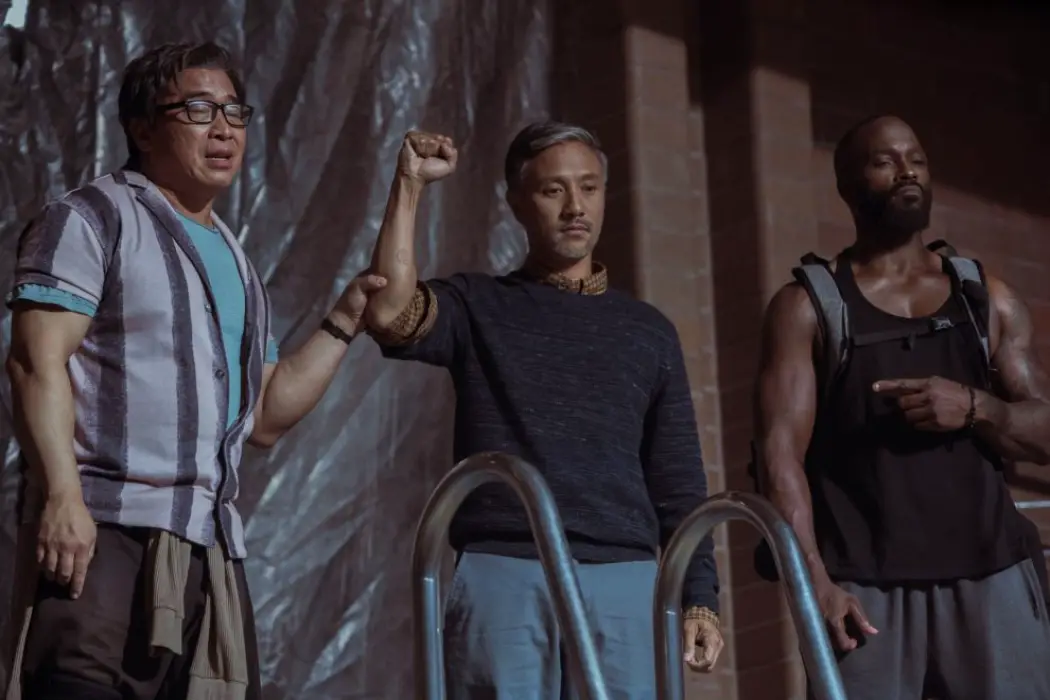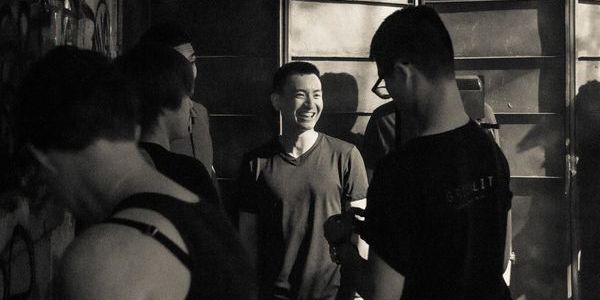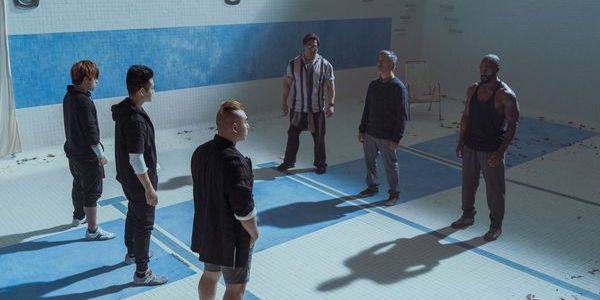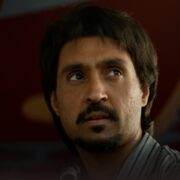Fantasia Film Festival 2020: Interview with Director Bao Tran of THE PAPER TIGERS

Wilson is a cinema enthusiast based out of Toronto, Canada.…
Bao Tran‘s feature directorial debut, The Paper Tigers, is a film born out of a deep personal passion for classic martial arts cinema. It’s a film that doesn’t necessarily fit into any conventional genre of Hollywood filmmaking and required crowdfunding support from the Asian community at large in order to get its feet off the ground. The result is something truly special, and Tran was nice enough to talk with Film Inquiry about his unique journey as an independent filmmaker.
Wilson Kwong for Film Inquiry: Let’s start off by talking a bit about your own background. I understand you’re from Washington, and had some training in martial arts growing up?
Bao Tran: I was doing it, kicking and screaming, literally! I was kind of a couch potato and my parents made me do Taekwondo and Kung Fu, and I just built that passion for it. So my two loves were movies and martial arts as I was growing up.
Can you talk about how you ended up training with Corey Yuen (legendary Hong Kong director)?
Bao Tran: He was a family friend and when I was in high school, he was incredibly generous in giving me tips and being a mentor. Back in the day, there was no YouTube and there were just video cameras, and I would make my little backyard videos trying to copy Jackie Chan‘s moves. Looking back, the fact that he would humour me in such a way is something I really cherish. He didn’t have to do that.
During that time, did you already know you wanted to be a filmmaker? Or was he just mentoring you in martial arts?
Bao Tran: Oh yeah, at that time, I was all in. I really wanted to make movies so it was a whole happenstance to have that opportunity. And it’s funny because he [Yuen] grew up in an opera school and it was very much a childhood of necessity. He thought it was kind of weird that I wanted to do movies because I had a passion for it since he felt like he went into movies because it was a survival field. Coming out of the opera school, there weren’t any jobs, so you just became a stunt man and moved up from there. That’s why he was very practical about the way he thought about films. And that grounded me and really helped me get my head out of the clouds and think very practically of what could be done.

And what about your cinematic influences growing up?
Bao Tran: I mean, there’s obviously Hong Kong films and there’s Corey for sure. Certainly, Jackie Chan, Sammo Hung, and Bruce Lee to me were the big models as far as growing up. For Bruce Lee, I could watch and appreciate what he was doing, and I admired that. But it wasn’t until I saw Jackie Chan that I was like, “Oh, I want to try it and do it.” So that was what hit me on the path as far as trying to actually understand cinema as a medium. Hearing Jackie Chan talk about how he was influenced by Buster Keaton and Gene Kelly, which just opened up a whole door for me as well because I just want to know what inspires the people that inspired me. Then you want to get empowered by all those sources and so silent films were also a huge influence for me.
Okay, let’s talk about The Paper Tigers and how it came together as a film. I understand that it started off as a Kickstarter campaign?
Bao Tran: It started probably even earlier than that, but Kickstarter was one of the things we used to try raising funds. In the States, we don’t have any film incentives or national film boards, so to raise money for an independent film, you just have to find a way to raise it yourself. And that’s the path we had to take, especially for an indie film where it was my first feature as a director. It was harder to convince people to hand over their cash to make this really happen, and so it’s just based on community support. Kickstarter was one of those avenues in which we could tap into our community and try to find a way to get support from the right people.
So I’ve been developing this now for several years – I think we’re counting on nine years here but we did go through the whole route of pitching to the Hollywood studios in the beginning. And there was a lot of interest, but they wanted to change the cast to white people. We had to deal with a lot of the whitewashing issue in casting because they were like, “Well, why not get Bruce Willis?” They want to give you money, but if you’re going to have an Asian star, who’s an Asian-American star? Who’s an Asian-Canadian star? There’s not a lot. So that’s a long-winded way of saying we had to reach out to our community because Hollywood was not going to be giving it to us. So that was what Kickstarter was really about and just putting us on the radar and in front of this whole community that we knew was there. We needed them to respond to it, and thankfully they did.
The film’s also very unique in that there aren’t a lot of stories set in the martial arts world about characters in their forties who weren’t necessarily in great physical shape. Was it hard selling this idea to other people?
Bao Tran: Right. I mean, that’s the constant challenge, especially when it’s your first feature and you’re trying to make a movie that’s different from what has been seen. And that’s the fine line that we had to ride, as far as trying to make everyone understand what we were trying to do. We would tell people it’s about these old guys who kind of get back in the game and they would go, “Oh, it’s like Shaolin Soccer.” Well, yeah, Shaolin Soccer is great, but this is a different tone and energy completely.
So that’s been the hardest thing because I always knew what we wanted to do in my head, but it’s hard to explain it to people and have people understand and have faith in you. Broadly speaking, I was like, “We want to do for Kung Fu movies what Dawn of the Dead did for zombie movies.” I don’t know if that meant anything to anyone when they heard it, but I always appreciated Dawn of the Dead for what it did because it was grounded and had real characters.
I thought the choreography in the film was very striking in that everything felt very practical. There wasn’t any wires or special effects, and it all felt very raw. Was this something that happened because of the smaller budget or was it a conscious decision to film the fight scenes this way?
Bao Tran: I would say a little bit of both because I knew this movie was my first feature and we wouldn’t have a lot of money. So even during writing, I was thinking about what makes sense as far as that approach and the type of action that we wanted to do. And it just happened to work out that we wanted to ground the characters and we didn’t want to get crazy. Like the idea of what would happen if these guys did pull their hamstrings and had to deal with it for the rest of the movie.
And then Ken Quitugua, our action director, was totally all in for this approach. And that’s not common to be honest, because when you have an action designer or choreographer come in, they want to show off their moves and pull a wire. So it’s very refreshing to work with him because he knew exactly what we were trying to do, and understood aesthetically what we wanted to go for. It’s a little messy and it should be messy. It’s not meant to be crisp or clean. The young kids, yeah, they’re crisp and clean, but not the old guys.

I think your approach to the fight scenes also makes them more relatable in a sense.
Bao Tran: Yeah, and that was a challenge in terms of casting. Do we want to go with proven martial arts actors who are really good at martial arts, but maybe not so great at acting? Or do we find great actors who can do martial arts? That’s the fine balance that we always had to figure out. Thankfully, with Ron Yuan, he kind of ticks those boxes, so it was a no brainer for us. But with Alain Uy, he’s not known as a martial arts actor. He’s an actor and he’s a really good one. And that’s what we were always trying to figure out and balance.
Since not all of the actors were trained in martial arts, did you end up doing a lot of training and rehearsing before the film? I ask this because all the fighting looks really good in the film!
Bao Tran: Oh, that’s great to hear! I mean, with an indie film, we don’t have all that time to rehearse so it was a crash course. And that’s the hardest thing because you’re trying to slot yourself in between things. At that time, Ron was coming up from Mulan, and Alain had this Hulu show. As an indie film, you have to plot yourself into their schedules. Thankfully, they made the time because they knew how important it was to do the work and try to look good. It was basically a crash course and all credit goes to our action team for basically doing a boot camp for these guys and figuring things out.
I think all the work definitely paid off! I’m curious as to whether you think it might be easier to pitch The Paper Tigers now, compared to 8-9 years ago, since there seems to be some progress when it comes to representation in Hollywood.
Bao Tran: That’s an interesting question. I think it would be different, but I don’t think it would be easier. It goes back to what you were asking before about what type of movie this is. I think it would come down to that. If we said that this was Shaolin Soccer, but starring Asian-American actors, that would be an easier sell. But if I was going to stay a little more grounded, I would start losing people. I think it’s just one of those things where you have to do what you believe in, and hopefully, you have other people support you and come along with you on the ride.
I’ll end off by asking you about the classic Sienna minivan that Alain Uy’s character (Danny) drives in the film. Here in Toronto at least, Siennas are often associated with older Asian families. It’s pretty much a known stereotype, especially back in the late 1990s. Was the decision to feature a Sienna minivan intentional on your part? Or am I just overthinking it?
Bao Tran: Well, again, with an indie film, it worked out because form and function come together. That was actually our producer’s dad’s car! He was Vietnamese and we were like, “Hey, can we use your car?” And he said, “Okay.” So it just kind of all worked out. The stereotype fits right there!
Film Inquiry would like to thank Bao Tran for taking the time to speak with us!
Does content like this matter to you?
Become a Member and support film journalism. Unlock access to all of Film Inquiry`s great articles. Join a community of like-minded readers who are passionate about cinema - get access to our private members Network, give back to independent filmmakers, and more.
Wilson is a cinema enthusiast based out of Toronto, Canada. He escapes from his day job by writing random thoughts about cinema on the internet. Although he has a longstanding penchant for Hong Kong cinema, he considers himself to be an advocate for Asian cinema in general. He has been attending the Toronto International Film Festival every year since 2005, and more of his work can be found on his website: www.wilson-kwong.com.













